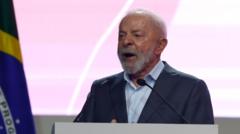Can Brazil's Lula Confront Fake News and Climate Deniers at the UN?

Published: 2025-11-10 17:00:14 | Category: technology
The urgent call from Brazil's President Luiz Inácio Lula da Silva to "defeat" climate denialism and combat misinformation underscores a critical moment at COP30. Amidst a backdrop of political tensions, the conference aims to address pressing climate issues, despite the absence of senior US officials, and seeks to galvanise global cooperation against the looming threat of climate change.
Last updated: 25 October 2023 (BST)
What’s happening now
The opening meeting of COP30, taking place in Belém, Brazil, has set the stage for a pivotal discussion on climate change. President Lula's remarks highlight a growing concern over climate denialism and the proliferation of false information that could hinder global efforts to combat climate change. With the US not sending senior officials, the dynamics of the talks could shift significantly, potentially affecting negotiations on critical issues such as fossil fuel reduction and climate financing.
Key takeaways
- President Lula emphasises the need to combat climate denialism at COP30.
- The absence of senior US officials raises concerns about the effectiveness of the talks.
- Brazil aims to secure funding for the Tropical Forest Forever Facility (TFFF) to protect global tropical forests.
- Discussions on maintaining the 1.5C temperature rise goal are contentious, with some nations lobbying for new agenda items.
- UN climate chief Simon Stiell highlights the economic impact of climate disasters on GDP.
Timeline: how we got here
The path to COP30 has been marked by significant milestones:
- January 2017: President Donald Trump takes office, promoting fossil fuel investments.
- September 2020: Trump brands climate change a "con job".
- October 2023: COP30 convenes in Belém, Brazil, amid political tensions and climate urgency.
What’s new vs what’s known
New today/this week
President Lula's assertive call to action against climate denialism is a notable development, signalling a renewed commitment to climate science and cooperation. The establishment of the TFFF aims to raise £125 billion for forest protection, although initial fundraising efforts have faced setbacks.
What was already established
The 1.5C target for limiting global temperature rise has been a cornerstone of international climate agreements. However, recent statements from the UN indicate an acceptance that exceeding this limit may be unavoidable, raising concerns about the effectiveness of current policies.
Impact for the UK
Consumers and households
UK households may face rising energy prices and changing regulations as global discussions on fossil fuels evolve. The UK has a vested interest in the outcomes of COP30, particularly regarding commitments to renewable energy and emissions reductions.
Businesses and jobs
As the UK continues to transition to greener energy sources, businesses may be affected by shifts in policy stemming from COP30 negotiations. Companies involved in fossil fuels could face increased scrutiny, while those in renewable sectors may benefit from new funding opportunities.
Policy and regulation
UK policymakers will be watching closely to see how the outcomes of COP30 influence domestic climate commitments. The government's approach to climate finance and emissions targets could shift depending on international agreements reached in Belém.
Numbers that matter
- £125 billion: The target fundraising goal for the Tropical Forest Forever Facility.
- Over £13 billion: The amount of funding for renewable energy cancelled by the Trump administration.
- 1.5C: The long-held goal for limiting global temperature rise, now in jeopardy.
- Double-digit GDP losses: Projected economic impact of climate disasters as stated by UN climate chief Simon Stiell.
- Thousands of delegates: The number of participants attending COP30 in Belém.
Definitions and jargon buster
- COP30: The 30th Conference of the Parties to the UN Framework Convention on Climate Change, focusing on global climate policy.
- Tropical Forest Forever Facility (TFFF): A proposed fund aimed at raising money to protect tropical forests worldwide.
- AOSIS: Alliance of Small Island States, a coalition of countries at risk from climate change impacts.
How to think about the next steps
Near term (0–4 weeks)
As COP30 progresses, immediate focus will be on establishing a clear agenda and priorities for discussions. Brazil's presidency will play a crucial role in facilitating dialogue among nations.
Medium term (1–6 months)
Following COP30, nations will need to assess the commitments made and begin implementing policies that align with the outcomes of the conference. This could involve legislative changes and increased investments in renewable energy.
Signals to watch
- Agreements reached on the conference agenda, particularly regarding fossil fuels and climate financing.
- Funding commitments made to the TFFF and other climate initiatives.
- Reactions from major economies, particularly the US, regarding their participation and stance on climate issues.
Practical guidance
Do
- Stay informed about developments from COP30 and how they might affect UK climate policies.
- Engage with local initiatives focused on sustainability and climate resilience.
- Support policies promoting renewable energy and reducing emissions.
Don’t
- Ignore the implications of global climate negotiations on local economies.
- Fall for misinformation regarding climate science and policy.
- Dismiss the need for immediate action on climate change.
Checklist
- Review your carbon footprint and explore ways to reduce it.
- Stay updated on UK government policies related to climate change.
- Consider supporting organisations that advocate for climate action.
- Participate in local climate initiatives or discussions.
- Educate yourself and others about climate science and misinformation.
Risks, caveats, and uncertainties
The ongoing negotiations at COP30 are fraught with uncertainty, particularly given the absence of US leadership. The potential for conflicting interests among nations may complicate discussions and delay agreement on critical issues. Furthermore, recent admissions from the UN regarding the inevitability of overshooting the 1.5C target highlight the challenges ahead in achieving meaningful climate action.
Bottom line
COP30 presents a crucial opportunity for the global community to confront climate denialism and recommit to scientific evidence in the fight against climate change. With significant challenges ahead, particularly regarding cooperation from major economies like the US, the outcomes of this conference will be vital for shaping future climate policy in the UK and beyond.
FAQs
What is COP30?
COP30 refers to the 30th Conference of the Parties to the UN Framework Convention on Climate Change, where global leaders discuss climate policies and actions.
Why is climate denialism a concern?
Climate denialism undermines scientific consensus on climate change, which can hinder global efforts to implement effective environmental policies.
What is the Tropical Forest Forever Facility?
The Tropical Forest Forever Facility (TFFF) is a proposed fund aimed at raising significant resources to protect tropical forests worldwide, with a goal of £125 billion.



